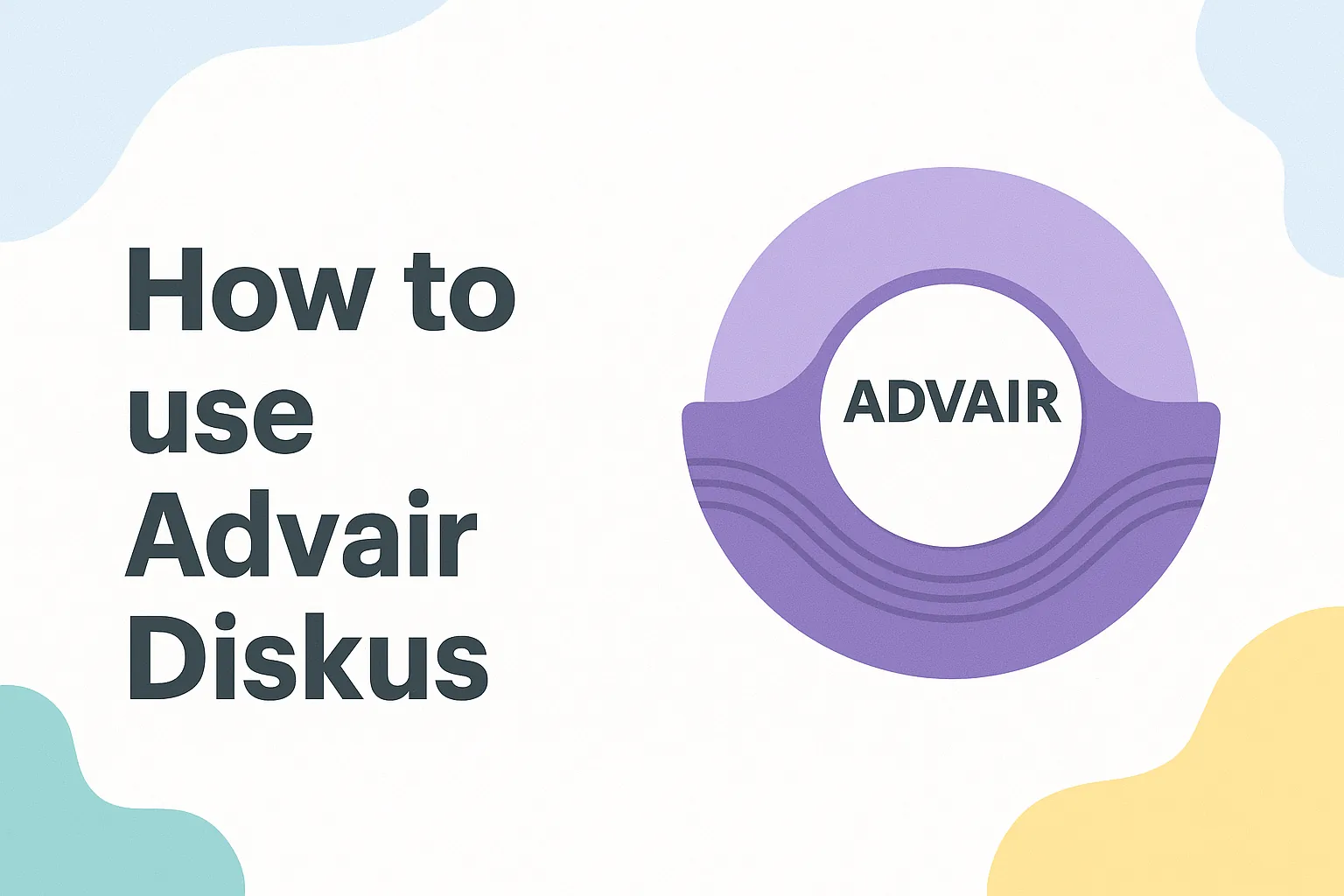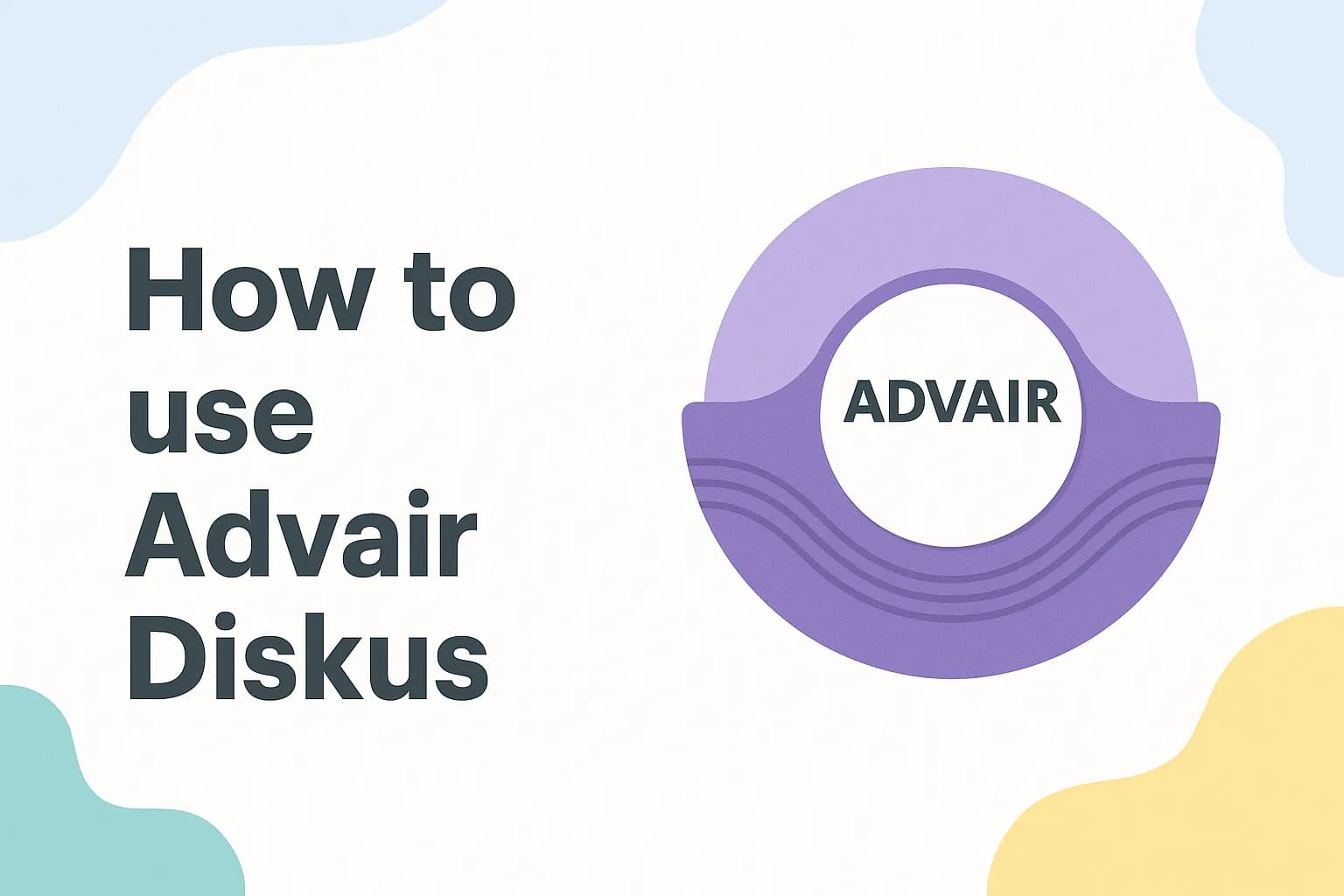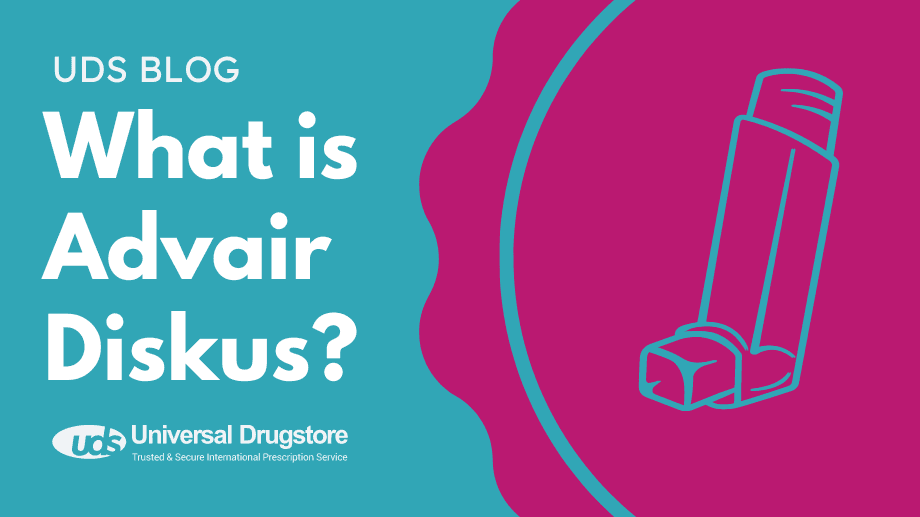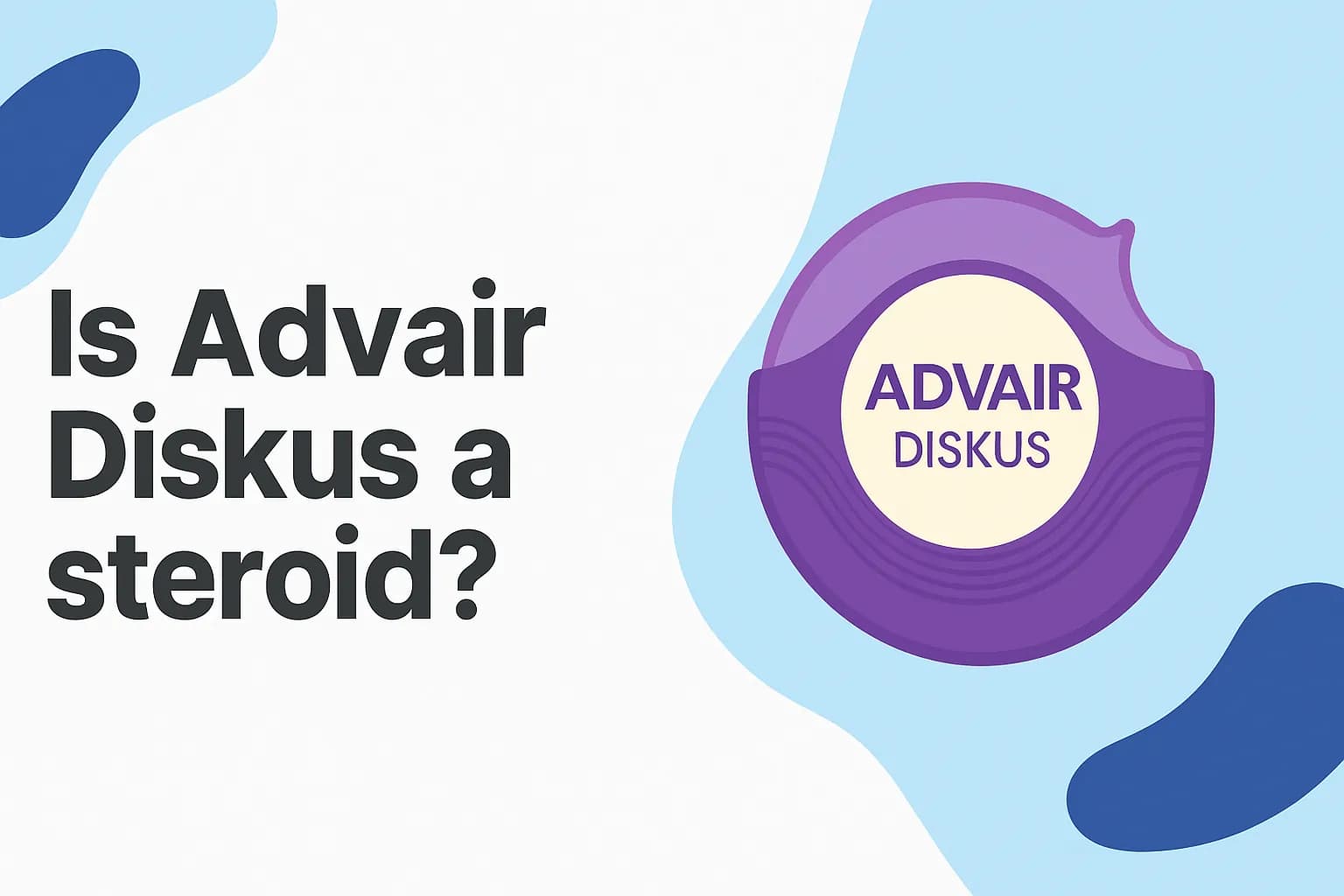How to use Advair Diskus?

Advair Diskus (fluticasone/salmeterol) is a combination dry powder inhaler that is used to treat chronic obstructive pulmonary disease (COPD) and asthma. COPD is a chronic lung disease that includes emphysema and chronic bronchitis.
You use an Advair Diskus inhaler differently than metered-dose inhalers, which contain a propellant to help get the medication into your lungs. Follow the steps below to learn how to use your Advair Diskus properly to ensure you receive the full dose of this medication.
Before you first use your Advair Diskus inhaler
Advair Diskus should be stored at room temperature in the foil pouch between 68°F and 77°F (20°C and 25°C) until you are ready to use it. Keep it away from direct sunlight in a cool, dry place out of the reach of children.
Write the date you opened the foil pouch on the first blank line on the label and the “use by” date, which is 1 month after you opened it, on the second blank line. The dose counter on your Advair Diskus should read 60.
Using your Advair Diskus inhaler
- To open your inhaler, Hold the Advair Diskus in one hand and place the thumb of your other in the thumb grip. Push the thumb grip away from you until you see the mouthpiece and it snaps into place.
- Hold your Advair Diskus inhaler in a level, flat position with the mouthpiece pointing to you. Then slide the lever away from the mouthpiece until you hear it click. The number on the dose counter will go down by one and your inhaler is ready to use.
- Before you breathe in to take your dose, breathe out for as long as you can while you hold the Advair Diskus level away from your mouth. Don’t breathe into the mouthpiece. Then put the mouthpiece to your lips and breathe in quickly and deeply through your mouth. Remove the inhaler from your mouth and hold your breath for around 10 seconds, or for as long as you can. Breathe out slowly as long as is comfortable for you. You may not feel or taste the powder after taking a dose. Do not take another dose if you don’t feel or taste the medicine.
- To close your inhaler, place your thumb in the thumb grip and slide it back towards you until it clicks shut and you can’t see the mouthpiece. When you’re ready to take your next dose, repeat Steps 1 through 4.
To help avoid irritation and thrush, rinse your mouth with water after each use. Spit out the water and do not swallow it.
Other important information
Don’t take your Advair Diskus apart and do not wash it. Your Advair Diskus should not be used with a spacer device. The American Lung Association has a video demonstrating the proper use of a Diskus inhaler. Click here to watch the full video.
Read on as we will discuss Advair Diskus’s common and serious side effects, what it is used for, potential drug interactions, and answer other frequently asked questions.
Advair Diskus FAQs
What is Advair Diskus used to treat?
Advair Diskus is a brand-name fluticasone propionate and salmeterol inhalation powder that is FDA-approved for the management of asthma symptoms in patients 4 years of age and older. It is also used in the maintenance treatment of COPD. Advair Diskus is not approved to treat acute bronchospasms (asthma attacks) and will not replace your rescue inhaler (albuterol).
How does Advair Diskus work to treat asthma and COPD?
Advair Diskus contains two different active ingredients: fluticasone propionate and salmeterol.
Fluticasone propionate is an inhaled corticosteroid (ICS). The exact way that it works to treat asthma is not well understood. It is thought to work directly in your lungs to reduce swelling and inflammation, making it easier for you to breathe.
Salmeterol is a long-acting beta-agonist (LABA). It is a bronchodilator that works by relaxing the muscles in your lungs to open up your airways, making it easier to breathe.
How often should Advair Diskus be used for asthma or COPD treatment?
Advair Diskus comes in 3 different strengths. Your healthcare provider will prescribe the strength that is right for you. It is important to follow your healthcare provider’s instructions on how to use Advair Diskus correctly. The recommended dosage is 1 inhalation twice a day. It should be used around the same time every day, about 12 hours apart.
What are the side effects of Advair Diskus?
While Advair Diskus is generally well-tolerated, like any medication, it can cause side effects. The most common side effects of Advair Diskus seen in clinical trials include:
- Upper respiratory tract infection
- Sore throat
- Headache
- Bronchitis
- Cough
- Nausea and vomiting
- Throat irritation and hoarseness
Other side effects seen with Advair Diskus include:
- Dizziness
- Oral thrush (fungal infection that causes sores or white patches in your mouth or throat)
- Stomach pain or discomfort
- Diarrhea
- Muscle pain
While less common, some individuals may experience serious side effects while using Advair Diskus. These side effects may require immediate medical attention. If you experience any of the following, contact your healthcare provider or seek emergency medical assistance:
Serious allergic reactions, which can be life-threatening. Symptoms can include:
- Hives
- Trouble breathing
- Swelling of the mouth, throat, and tongue
Acute bronchospasm.
Medications like Advair Diskus can sometimes cause muscle spasms in your lungs which can lead to shortness of breath, wheezing, cough, and chest pain or discomfort.
If you have worsening breathing after using Advair Diskus, use your rescue inhaler and get medical attention immediately.
Increased risk of infections.
Advair Diskus contains an inhaled corticosteroid (fluticasone), which can weaken your immune system and make you more likely to get an infection.
Shop Medications
Notify your healthcare provider right away if you develop symptoms of infections, such as fever, chills, or body aches.
Changes in your stress hormone levels.
This can happen when you stop taking an oral corticosteroid medication (prednisone) and start taking Advair Diskus.
Let your healthcare provider know if you experience fatigue, nausea and vomiting, lack of energy, low blood pressure (hypotension), or weakness.
Delayed growth in children.
Children who use inhaled steroids, like Advair Diskus, might experience a delay in growth. To lower this risk, your child’s healthcare provider will use the lowest dose needed to help treat their condition. You should also check your child’s growth regularly while they’re receiving this medication.
Eye problems.
Although rare, people using Advair Diskus over a long time may have higher pressure in their eyes, cataracts, and glaucoma. Contact your healthcare provider if you notice any changes to your vision while using this medication.
Heart problems.
The long-acting beta-agonist, salmeterol, can cause high blood pressure, increased heart rate, and an irregular heartbeat.
You may need to regularly check your blood pressure and heart rate at home if you have heart problems. Do not use Advair Diskus more than prescribed. Tell your healthcare provider if you have tremors, dizziness, rapid heartbeat, fatigue, or weakness after you start this medication.
Low potassium levels.
This medication can cause the potassium levels in your blood to decrease, especially if you use more than recommended. The change in your potassium is usually mild and temporary. Let your healthcare provider know if you have any tiredness, weakness, muscle cramps, a racing heart, or a “pins and needles” feeling in your hands and feet.
Weakened bones and osteoporosis.
These are not all of the possible side effects of Advair Diskus. You should always seek medical advice from your healthcare provider for any questions or concerns about your medical condition or treatment. Read all patient information, medication guides, or drug information sheets that come with this medication. You can also report adverse effects to the FDA at www.fda.gov/medwatch or 1-800-FDA-1088.
What drugs interact with Advair Diskus?
Advair Diskus may interact with other medications, supplements, or foods, potentially affecting its effectiveness or increasing the risk of side effects. It is important to inform your healthcare professional about all the medications, including prescription drugs, over-the-counter medications, vitamins, and supplements you are taking, including:
- Strong CYP3A4 inhibitors such as ritonavir and ketoconazole should not be used with Advair Diskus.
- Tricyclic antidepressants (amitriptyline) and monoamine oxidase inhibitors (phenelzine) should be used with extreme caution.
- Beta-blockers (atenolol) and diuretics (furosemide) should be used with caution while on this medication.
Who should not take Advair Diskus?
Advair Diskus is contraindicated if you have a known allergy to fluticasone, salmeterol, milk proteins, or any other inactive ingredients in this product.
You should also make sure your healthcare provider is aware of your medical conditions before you start taking Advair Diskus, including:
- Heart problems such as high blood pressure or irregular heartbeat
- Seizures
- Thyroid issues
- Diabetes
- Liver issues
- Osteoporosis
- Immune system issues
- Current or history of eye problems such as cataracts, glaucoma, or increased pressure in your eye
- Any type of bacterial, fungal, or viral such as herpes or tuberculosis
- Exposure to measles or chickenpox
- Taking antifungals or medications for HIV
- Pregnant or plan on becoming pregnant; it is not known if the medications in Advair Diskus will cause harm to your unborn baby
- Are breastfeeding or plan to breastfeed; it is not known if the medications in Advair Diskus pass into breast milk and what effect they might have on your breastfed infant
Do you shake Advair Diskus?
You should keep your Advair Diskus in a dry place at room temperature. Never place the Advair Diskus in water and never shake or breathe into it.
How often do you take Advair Diskus?
The usual dosage of Advair Diskus is one inhalation two times a day around the same time each day. The two doses should be taken about 12 hours apart.
What happens if you do not rinse your mouth out after using Advair Diskus?
You should rinse your mouth with water without swallowing after each use of your Advair Diskus inhaler. This will help decrease your chance of getting a yeast infection (thrush) in your mouth and throat.
Is it okay to use Advair Diskus every day?
In order for Advair Diskus to help prevent asthma attacks and COPD flare-ups, you have to use it every day in regularly spaced doses, as prescribed by your healthcare provider. Do not change your dose or stop using Advair Diskus unless you have discussed this with your healthcare provider.
Related medications
- Advair HFA (fluticasone propionate/salmeterol)
- Flovent Diskus (fluticasone propionate)
- Serevent Diskus (salmeterol)
- Dulera (mometasone/formoterol)
- Symbicort (budesonide/formoterol)
- Breo Ellipta (fluticasone furoate/vilanterol)
- Trelegy Ellipta (fluticasone furoate/umeclidinium/vilanterol)




